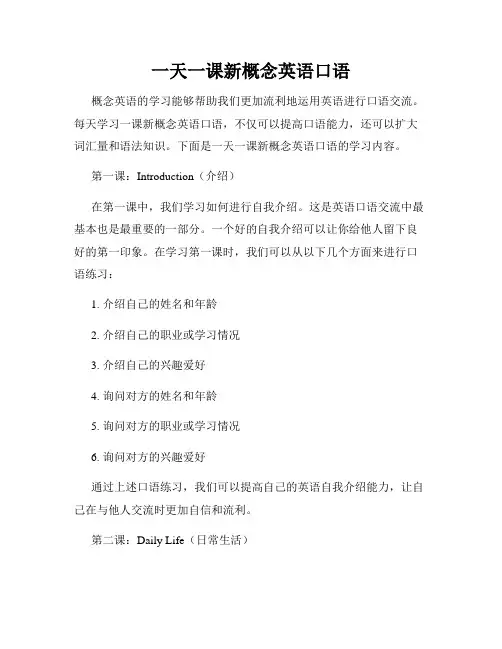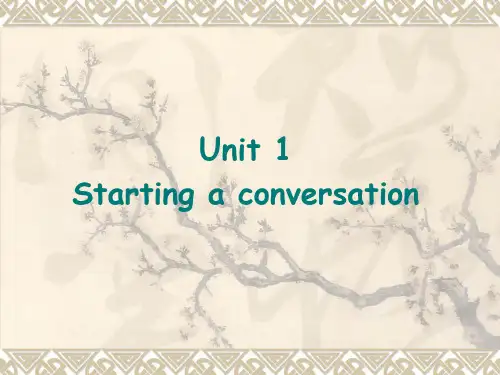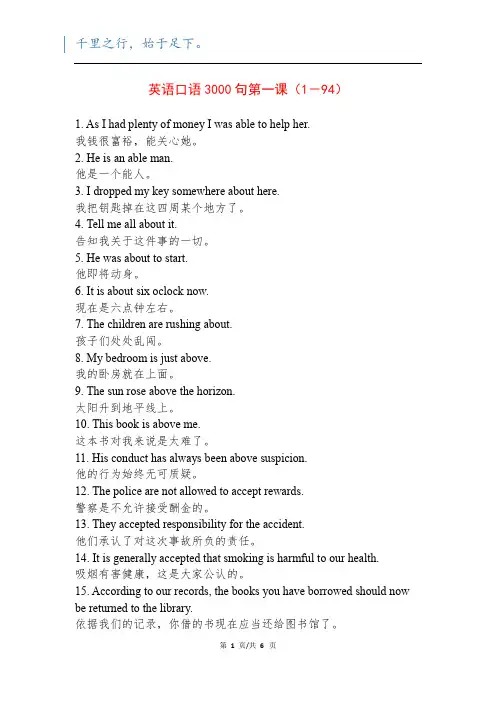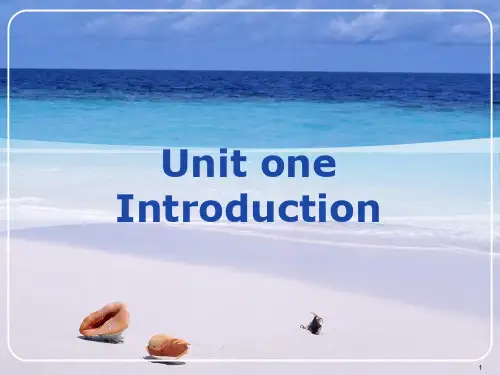成人英语口语辅导基础篇(第一课)
- 格式:doc
- 大小:107.08 KB
- 文档页数:4


一天一课新概念英语口语概念英语的学习能够帮助我们更加流利地运用英语进行口语交流。
每天学习一课新概念英语口语,不仅可以提高口语能力,还可以扩大词汇量和语法知识。
下面是一天一课新概念英语口语的学习内容。
第一课:Introduction(介绍)在第一课中,我们学习如何进行自我介绍。
这是英语口语交流中最基本也是最重要的一部分。
一个好的自我介绍可以让你给他人留下良好的第一印象。
在学习第一课时,我们可以从以下几个方面来进行口语练习:1. 介绍自己的姓名和年龄2. 介绍自己的职业或学习情况3. 介绍自己的兴趣爱好4. 询问对方的姓名和年龄5. 询问对方的职业或学习情况6. 询问对方的兴趣爱好通过上述口语练习,我们可以提高自己的英语自我介绍能力,让自己在与他人交流时更加自信和流利。
第二课:Daily Life(日常生活)在第二课中,我们学习如何用英语描述日常生活。
日常生活是我们每个人都会经历的,所以学习如何用英语描述日常生活对于提高口语能力非常重要。
以下是一些日常生活的口语表达:1. 描述起床和洗澡的时间和习惯2. 描述吃早餐、午餐和晚餐的时间和食物3. 描述做家务和上班或上学的时间和情况4. 描述与家人或朋友的交流和活动5. 描述娱乐活动,如看电影、购物和运动通过学习和练习以上日常生活的口语表达,我们可以更好地进行英语口语交流,与他人分享和交流自己的日常生活。
第三课:Travel(旅行)在第三课中,我们学习如何用英语描述旅行经历。
旅行是人们生活中非常重要的一部分,通过参观不同的地方,我们可以了解到不同的文化和风俗。
以下是一些旅行的口语表达:1. 描述旅行的目的地和时间2. 描述旅行的方式,如乘坐飞机、火车或汽车3. 描述旅行中参观的景点和体验的活动4. 描述旅行中遇到的人和交流的经历5. 描述旅行的收获和感受通过学习和练习以上旅行的口语表达,我们可以更好地分享和交流自己的旅行经历,同时也可以更好地了解他人的旅行经历。

SpeakingLecture 1IELTS口语考试的形式Part One ------- Talk about yourselfPart Two ------- Describe a topicPart Three ----- Discuss the general situationThe most recent questionsConfirming InformationMay I know your full name?My name is ….My f amily name is …and my given name is… Family name就指姓,given name就指名And what would you like me to call you?My friends call me… / you can call me …Example 1: 解释姓名含义Would you please tell me your full name? How can I call you?Well, my sur name is Lu, and my given name is Yiping, so together it’s Lu Yiping. But I guess it’ll be easier for you to address me by my English name, Hope.Does your name have any special meaning?•As a matter of fact, I got this name from my grandfather who tragically died a few weeks before I was born. He gave this name to me just as a symbol of my birth date. I was born in February 1981.•The first character of my given name Yi, which means ONE, represents the year of my birth; the second character stands for a very special February according to traditional Chinese calendar which is called PING, a second February that occurs every four years.•Where are you from?•May I ask where you are from? / Where is your hometown?Sure, I’m from …which is in…ProvinceWhat I Do职业,兴趣爱好,生活习惯等What do you currently do?/ Are you working or studying or what?I am still a college student / I am working in a IT company.•For students•How long have you been studying there? Or what year are you in?I have be en studying for…/ I’m a second year student./ I’m freshman/sophomore/junior/senior•What’s your major?My major is …/My field of study is…/ I graduated in ..专业in 2005 from 你的大学/ I specialize in …. Do you like your major or why did you choose that university?Yes, I think so. As I see, my university is….Why? No, I don’t think so because…Questions about your future plan•What are your future study plans?/•What are you going to do after you finish your study?•I’m going to do my postgraduate study in Australia/Canada sometime next year. /I will do my MBA there in next one or two years.•Hopefully, I could find a job there when I graduate.•For graduated person 已经工作的人•What do you currently do?I am a teacher in a high school/office staff… in a famous foreign company.How long have you been working there?It’s my second year./ I have been working there for three years.How do you get to work everyday?I usually get to work by bus. But if I’m in a hurry or the weather is bad, I’ll take a taxi, though it is a bit expensive.Do you enjoy your work? / Do you like your job?Yes, I am quiet happy doing business because I am interested at earning money.No, I don’t think it is a nice job because….Questions about your job:•What’s the money like?•What’re your hours like?•What is your boss like?•Do you have to work on weekends?•Do you get much holiday?•Do you have to travel far to work?For all: some general questions in part 1•What kind of place is your hometown?•Is there any interesting place in your hometown?•Do you have any hobbies?•What do you usually do in your spare time?•What do you usually do each day?Sample answer 1: 书上201页Lesson 1 Just call me MaryLesson 2 Could I have your identification?Lesson 3 The marketing majorV ocabulary Building•Confirm 确定,确认information 信息•Full name 全名nice and slowly 清楚地,慢慢地•Identification 身份证明introduce 介绍•Confirm a few pieces of information 确认/核实几条信息•Not to worry 不用担心,没事•Capital 首都currently 目前,现在•Popular 受欢迎的•bachelor’s degree 学士学位•Master’s degree 硕士学位major 专业•Marketing 市场营销engineering工程学accounting 会计学•Sales manager 销售经理accountant 会计•Most of the day 大部分时间spend 度过,花费Lesson 6 Hometown•I: Let’s talk about your hometown. What kind of place is it?•C: My hometown is a large industrial city and it is in Guangdong Province in the southwest of China. Perhaps you have heard of it?It’s called Guangzhou.•I: Are there any interesting places to see there?•C: Oh, yes. Even though Guangzhou is very modern, it has some interesting temples and parks. There is one called the Temple of Six Banyan Trees and it was built about 1500 years ago.•I: What kind of surrounding landscape does it have?•C: Well, Guangzhou is a coastal city at the edge of a sea inlet. It’s also surrounded by a river called the Pearl River.•I: What kinds of activities can you do there?•C: Well, there are lots of parks to visit. You can go to many different pubs and restaurants and if you come in April or October you can go to the Trade Fair.•I: What do most people in Guangzhou do for a living? I mean what are the major industries?•C: Guangzhou has very kind of industry. It is very close to Hong Kong so a lot of the industries involve trade and retail. It is also a finance area.•I: Do you think the economy there is growing?•C: Yes, Guangzhou has been growing a lot. There are lots of job opportunities and many new buildings being built every year.How to introduce the economy in your hometown•一个地方经济状况的好坏可以从以下这些方面进行讨论:Because of the influence of financial crisis,•首先是the inflation is going up; 通货膨胀高会导致the cost of living is high, for example the price of food and renting is going up;接下来物价上涨会使得the quality of life is going down. As a result, people aren’t willing to spend a lot of money; 那么人们生活质量下降就最终导致many factories close down and shops go out of business then there are a lot of unemployment in the city. 有很多人失业•最后总结:The economy is in a bit of mess•第二部分:Learn to narrate an event.Words and expressions of time sequence•As soon as 一。

【最新整理,下载后即可编辑】一、人称代词用【宾格】形式;2. 名词性物主代词需要在具体的语境(有上下文)中使用。
例如:Whose car is this? 这是谁的车It’s mine. --我的。
(此处相当于It’s mycar.)二、英语句式1.句式分类肯定句一般疑问句:以be动词、助动词do发问疑问句特殊疑问句:以特殊疑问词when, what,where, why, how等发问2.疑问句变肯定句(1)一般疑问句a.含be动词的句子:直接将be动词提至句首,同时注意be动词的形式,对应人称的变化。
例如:I am Mike. 我是迈克。
对该句进行提问:Are you Mike? 你是迈克吗?b.含实义动词的句子:在句首加上助动词do,同时注意助动词do的形式,对应人称的变化。
例如:I have many friends. 我有很多朋友。
对该句进行提问:Do you have any friends? 你有朋友吗?备注:实义动词指表示具体动作的动词,如表示跳、说、唱、跑等动词。
(2)特殊疑问句a.含be动词的句子:直接将be动词提至句首,并在句首加上特殊疑问词,同时注意be动词形式,对应人称的变化。
例如:My name is Mike. 我的名字是迈克对该句进行提问:What is your name? 你叫什么名字?b.含实义动词的句子:在句首加上特殊疑问词和助动词do,同时注意助动词do的形式,对应人称的变化。
例如:I went to Shanghai yesterday. 我昨天去上海了。
对该句进行提问:When did you go to Shanghai? 你什么时候去了上海?三、特殊疑问词特殊疑问词中文意思提问对象what 什么内容when 什么时候时间why 为什么原因how 怎么方式英语与中文的一主要区别在于英语很强调时态,即不同的时间,动词要用不同的形式(时态通过谓语动词体现)。


英语口语系列讲座1第一课第一局部开心英语客栈Two young boys were spending the night at their grandparents'. At bedtime, the two boys knelt beside their beds to say their prayers when the younger one began p raying at the top of his lungs. "I pray for a new bicycle...."His older brother asked, "Why are you shouting your prayers? God isn't deaf."the younger one replied, "No, but Grandma is!"第二局部音标学习元音字母a,e,i,o,ua :[ei] [?]namebagplanedadbabyhatcakemape:[i:]he me Chinese these[e]bed let pen deski:[ai]bike drive time nice[i]fish big pig swim第三局部功能句子练习Asking for things 请求他人帮助或索要东西时,常用句型如下:A:good morning, sir. Can I help you?B:good morning! You know I’m looking for a sweater. A:then what color do you like?B:I’d like blue, light blue. I think it looks nice.A:OK. What about the one in the window? Do you like the style? B:OK, could I have a try?A:Certainly, wait a moment.1.I ’d likea camera2.I ’m looking for3.Could I have, please? a sweater4.Give me your , will you?some watera walkman要求:请使用自己知道的三个新名词进行句子补充练习。


英语口语3000句第一课(1-94)1. As I had plenty of money I was able to help her.我钱很富裕,能关心她。
2. He is an able man.他是一个能人。
3. I dropped my key somewhere about here.我把钥匙掉在这四周某个地方了。
4. Tell me all about it.告知我关于这件事的一切。
5. He was about to start.他即将动身。
6. It is about six oclock now.现在是六点钟左右。
7. The children are rushing about.孩子们处处乱闯。
8. My bedroom is just above.我的卧房就在上面。
9. The sun rose above the horizon.太阳升到地平线上。
10. This book is above me.这本书对我来说是太难了。
11. His conduct has always been above suspicion.他的行为始终无可质疑。
12. The police are not allowed to accept rewards.警察是不允许接受酬金的。
13. They accepted responsibility for the accident.他们承认了对这次事故所负的责任。
14. It is generally accepted that smoking is harmful to our health.吸烟有害健康,这是大家公认的。
15. According to our records, the books you have borrowed should now be returned to the library.依据我们的记录,你借的书现在应当还给图书馆了。



成人零基础学英语口语
成人零基础学英语口语,可以参考下述建议:
1. 学习基础英语语法和词汇:英语学习的基础知识对于学习任何语言都是至关重要的。
如果没有英语语法和词汇的基础,那么学习英语口语会比较困难。
可以通过英语教材、网上资源或者英语学习应用程序来学习基础知识。
2. 练习发音和语调:正确的发音和语调对于英语口语来说非常重要。
可以通过听力练习和模仿母语人士的发音和语调来提高自己的口语能力。
3. 练习口语交流:练习口语交流是学习英语口语的关键。
可以通过和英语母语人士交流、参加英语角、加入英语学习社区等方式来提高自己的口语交流能力。
4. 多听、多说、多读:多听、多说、多读是学习英语口语的有效方法。
可以通过听英语广播、看英语电影、阅读英语文章等方式来提高自己的口语表达能力。
5. 培养自信心:学习英语口语需要自信心和勇气。
不要害怕犯错,相信自己的能力,尽可能多地练习和表达。
总结起来,学习英语口语需要耐心和坚持,通过不断的练习和积累,可以提高自己的英语口语能力。
成人零基础自学英语口语【原创实用版】目录1.成人零基础自学英语口语的重要性2.成人零基础自学英语口语的难点3.提高成人零基础自学英语口语的方法4.坚持学习的建议正文随着全球化的发展和国际交流的日益频繁,英语已经成为了一种必不可少的工具。
对于许多成人来说,零基础自学英语口语是一项极具挑战性的任务。
本文将探讨成人零基础自学英语口语的重要性、难点、提高方法以及坚持学习的建议。
首先,成人零基础自学英语口语的重要性不言而喻。
英语是世界上使用最广泛的语言之一,掌握英语口语不仅能够提高个人的综合素质,还可以为工作和生活带来更多的机会。
尤其是在我国,英语已经纳入了中高考等重要考试,学好英语对于成人来说也是为了更好地辅导下一代。
然而,成人零基础自学英语口语的过程中会遇到诸多难点。
例如,发音不准、词汇量不足、语法掌握不熟练等。
为了克服这些难点,我们需要采取一些有效的方法来提高英语口语水平。
提高成人零基础自学英语口语的方法有很多。
首先,可以通过观看英语电影、电视剧和纪录片等来提高自己的听力水平,从而更好地模仿标准发音。
其次,可以参加一些线上或线下的英语角,与母语为英语的人进行交流,增加实际应用英语的机会。
此外,还可以下载一些英语学习软件,如背单词软件、英语口语练习软件等,有针对性地进行学习。
最后,坚持学习是提高英语口语的关键。
学习英语口语是一个长期的过程,需要付出时间和精力。
因此,建议成人在学习过程中要有耐心和毅力,每天抽出一定的时间进行学习和练习。
此外,可以设定短期和长期的学习目标,以便更好地激励自己。
总之,成人零基础自学英语口语虽然具有一定的难度,但只要掌握正确的方法并坚持学习,就一定能够取得显著的进步。
在这个过程中,我们需要关注英语口语的重要性、克服难点、采用有效的提高方法以及保持学习的毅力。
三一口语第一级第一讲1、GreetingGood morning. Good afternoon . Good evening. Good night.How are you?Nice to meet you.Nice meeting you.How do you do ?What’s your name? My Chinese name is … .My English name is… . How old are you ? I’m 9 years old.Are you a boy? No,I ’m not.I’m a girl./Yes,I ’m.2、Colorsbule 蓝色black黑色yellow 黄色pink粉色green 绿色red红色purple紫色orange桔色brown棕色grey灰色white白色3、ClothesT-shirt dress shirt trousers (a pair of trousers) handbagjeans(a pair of jeans) skirt shoes (What are they? They are shoes.)vest shorts (a pair of shorts) jacket hat cap socks (What are they? They are socks.) gloves scarf sweater4、Animalscat rabbit turtle tiger parrot horse sheep panda dogelephone frog bat penguin duck fish hen wolf whale bee bird cow chicken butterfly crocodile snake giraffe spiderlion fox hippo monkey zebra kangaroo4、At schoolpencil book pen pencil brush paper ruler school bag crayon eraser sharpener desk chair blackboard door window mop TV clock map flag computer desk5、HouseDining room living room kitchen bathroom garden bedroom6、In roomComputer desk toys bed TV sofa telephone picture mirror lamp clock wardrobe table refrigerator bowl plate knife7、Body and faceeye ear cheek nose mouth chinhead neck shoulder back waist hip knee1、How are you?I’m fine. Thank you .And you?2、Nice to meet you.Nice to meet you,too.3、Nice meeting you.Nice meeting you,too.4、How do you do .How do you do.5、What’s your name?My name is …….my English is……...6、How old are you ?I’m ……years old.7、Are you a boy?Yse,I am. No, I ’m not.8、Where are you from?I’m from Beijing.9、What’s this?/What’s that?It’s a ………10、What are these?/What are those?These are………11、Is this jacket new?Yes, it is. No,it isn’t.12、Is this your pencil?Yse , it is. No, it isn’t.13、Is this his bag?Yes, it is . No, it isn’t.14、Are those xiaoxiao’s shoes?Yes, those are. No, those aren’t.15、What color is your hat?It’s ………..16、Are these trousers dirty?17、What’ s your favorite number?My favorite number is ………18、Is that a panda?Yes, it is. No, isn’t.19、What’ s this?It’s…….20、How many book are there on the table?There are ……..books on the table.21、What color are your shoes?They are22、How many people are there in your family?There are three people in my family.23、Who are they?My father my mother and me.24、Do you have any brothers or sisters?25、Where do you study?26、Which Grade are you in?I’m in Grade one.27、Which Class are you in ?I’m in Class ……..28、Please introduce yourself ?。
成年人英语口语1. IntroductionEnglish is one of the most widely spoken languages in the world and is widely used in various fields such as business, travel, and education. As an adult, improving your spoken English can significantly enhance your communication skills, confidence, and opportunities. In this document, we will explore various tips and techniques to help adults improve their spoken English.2. Importance of Oral CommunicationEffective oral communication is crucial for adults as it enables them to express ideas, opinions, and thoughts in various professional and social situations. Being able to speak fluently and confidently in English can help adults land better job opportunities, build professional networks, and engage in meaningful conversations in social gatherings.3. Building VocabularyVocabulary is the foundation of any language, and improving it is vital for enhancing spoken English. Here are some strategies for building vocabulary:•Word Lists: Create word lists based on different topics such as professions, hobbies, technology, etc. Review these lists regularly to reinforce your learning.•Reading: Read books, newspapers, and articles in English to encounter new words and phrases. Use adictionary to look up unfamiliar words and understandtheir meanings.•Flashcards: Create flashcards with new words and their definitions. Carry them with you and review themwhenever you have spare time.•Contextual Learning: Learn words in context by reading sentences and paragraphs. This helps understand the usage and meaning of words more effectively.4. Practicing PronunciationPronunciation plays a crucial role in spoken English. Improper pronunciation can lead to misunderstandings and hinder effective communication. Here are some techniques to improve pronunciation:•Listen and Repeat: Listen to native speakers or recordings of native speakers and repeat the words andphrases after them. Focus on imitating their pronunciation and intonation patterns.•Record Yourself: Record yourself speaking in English and listen to it. Compare your pronunciation with that of native speakers and identify areas for improvement.•Mimic Native Speakers: Watch movies, TV shows, or videos featuring native English speakers. Try to mimic their accent, rhythm, and intonation to improve your own pronunciation.•Speech Therapy Apps: Use speech therapy apps that provide exercises and feedback to improve yourpronunciation.5. Engaging in ConversationsEngaging in real-life conversations is crucial for improving spoken English. Here are some ways to practice conversational skills:•Join Language Groups: Join language exchange groups or conversation clubs where you can interact with native English speakers or other learners. Engage inconversations on various topics to practice your speaking skills.•Language Apps: Use language-learning apps that provide conversation practice with AI or native speakers.These apps often provide feedback to help you improveyour fluency and accuracy.•Practice with Friends: Find a language learning partner or a friend who is also learning English. Practicehaving conversations with them regularly, focusing ondifferent topics and aspects of spoken English.6. Enhancing Listening SkillsImproving listening skills is essential for understanding spoken English and participating effectively in conversations. Here are some techniques to enhance listening skills:•Podcasts: Listen to podcasts in English on topics of interest. Focus on understanding the content and train your ears to comprehend different accents and speech patterns.•TED Talks: Watch TED Talks or other speeches in English and pay attention to the speaker’s pronunciationand delivery. Take notes on key points to reinforce yourlistening skills.•News Programs: Listen to English news programs or watch English news channels. This helps you becomefamiliar with current affairs, while also improving yourlistening skills.•Audio Books: Listen to audio books in English. Start with books that have a simpler language and graduallyincrease the difficulty level.7. Immersion and PracticeImmersing yourself in an English-speaking environment and practicing regularly is an effective way to improve spoken English. Here are some tips to create an immersive environment:•Watch TV Shows and Movies: Watch English TV shows and movies with English subtitles. This helps youunderstand context, improve vocabulary, and learn newphrases.•Read Aloud: Read books or articles aloud in English.This helps improve pronunciation, fluency, and overallspeaking skills.•Think in English: Practice thinking in English by mentally translating your thoughts into English. This helps you become more comfortable with the language.•Keep a Diary: Write a daily diary in English. This helps improve writing skills while also practicing thinking and expressing yourself in English.8. ConclusionImproving spoken English as an adult may seem challenging, but with regular practice and dedication, it is achievable. Follow the tips and techniques mentioned in this document to enhance your vocabulary, pronunciation, conversational skills, listening abilities, and overall fluency in English. Remember that consistency is key, and with time and effort, you will see significant improvements in your spoken English abilities.。
成人英语口语初级介绍与问候的12个场景对话+语法+例句(1)Nice to meet youA:Good morning.早上好。
B:Good morning.早上好。
A: I'm Tim.我叫Tim。
B:Hi, Tim. I'm Susie.Tim,你好,我叫 Susie。
A:Nice to meet you,Susie.很高兴认识你,Susie。
B:Nice to meet you too, Tim. 我也很高兴认识你,Tim。
相关语法:在英文中,I, you, he, she是大家再熟悉不过的词汇了。
这些词都是用来指代人的,被称为人称代词。
同时它们通常是用来做主语的,因而被称为人称代词主格。
人称代词主格有:其中第一人称单数是I,复数是we。
第二人称是you,既能用来表示单数,也可以表示复数。
第三人称单数有he, she, it,而复数为they。
例句:I love music.我爱音乐。
He is a teacher.他是一位老师。
They are nice.他们人很好。
(2)What's your name?A:Hi, my name is Tony.What's your name? 嗨,我叫Tony。
你叫什么?B:I'm Amy. Nice to meet you.我叫Amy。
很高兴见到你。
A:Nice to meet you too.我也很高兴见到你。
B:Where are you from?你来自哪里?A:I'm from Beijing. You?我来自北京。
你呢?B:I'm from New York.我来自纽约。
相关语法用What's your...来提问本课对话围绕What's your name (你的名字是什么?)这个问题来展开。
What's your..是个常见的提问方式,表示“你的...是什么?”。
成人英语口语辅导课程(基础篇)第一课时一、字母
二、音标图。
三、基础表达法
1、年份
关于四位数年份的读法有下列几种情形:
(1) 一般情况下,将表示年份的四个数字按前后分为两组,每一组的数字都按基数词来读。
例如:
1865年读作eighteen sixty-five
1998年读作nineteen ninety-eight
(2) 如果是整百的年,后面的两个“零”读为hundred。
例如:
1900年读作nineteen hundred
1800年读作eighteen hundred
(3) 十位数字上为“零”,该“零”读为字母O的发音。
例如:
1809年读作eighteen O nine
(4) 关于千年的一些读法。
2000年读作two thousand 或twenty hundred
2008年读作two thousand and eight 或twenty O eight
1008年读作one thousand and eight 或ten O eight
(5) 三位以内数字的年份,它们有两种读法:一种是按照基数词的方法来读,另一种是一个一个数字来读。
例如:
531 BC
读作five three one BC
或five hundred and thirty-one BC
2、日期
日期的写法可以采用基数词和序数词两种形式。
例如:March 1也可以写成March 1st;May 29也可以写成May 29th。
但是,日期的读法只能用序数词的形式。
例如:
October 31(October 31st)读作October(the)thirty-first
August 26(August 26th)读作August(the)twenty-sixth
3、时间
时间的读法有以下一些特点:
(1) 可以直接按照表示时间的数字来读。
例如:
10:56读作ten fifty six
8:30读作eight thirty
(2) 正点后的前半小时,通常说几点“过”(past)几分。
例如:
9:25读作twenty-five past nine
2:16读作sixteen past two
(3) 正点后的后半小时,通常说几点“差”(to)几分。
此时,所说的“几点”指的是“正点”后的下一个“正点”。
例如:
10:55读作five to eleven
8:40读作twenty to nine
(4) 英语中的15分钟也可以说成“一刻钟”(a quarter)。
例如:
4:15读作a quarter past four
7:45读作a quarter to eight
45分钟读作three quarters
四、英文数字的写法
表示数目的词称为基数词。
其形式如下:
A:从1-10
one two three four five six seven eight nine ten
B:从11-19
eleven twelve thirteen fourteen fifteen sixteen seventeen eightteen ningteen
这里除eleven twelve thirteen fifteen eightteen为特性形式外,fourteen sixteen seventeen ningteen
都是由其个位数形式后添加后缀-teen构成。
C:从20-99
整数几十中除twenty thirty forty fifty eighty为特许形式外,sixty seventy ninrty
都是其个位数形式后添加后缀-ty构成
表示几十几时,在几十和个位基数词形式之间添加连字符“—”,如:21 twenty-one 76 seventy-six
D:百位数
个数基数词形式加“hundred”,表示几百,在几十几与百位间加上and。
101 a hundred and one
320 three hundred and twenty
648 six hundred and forty-eight。